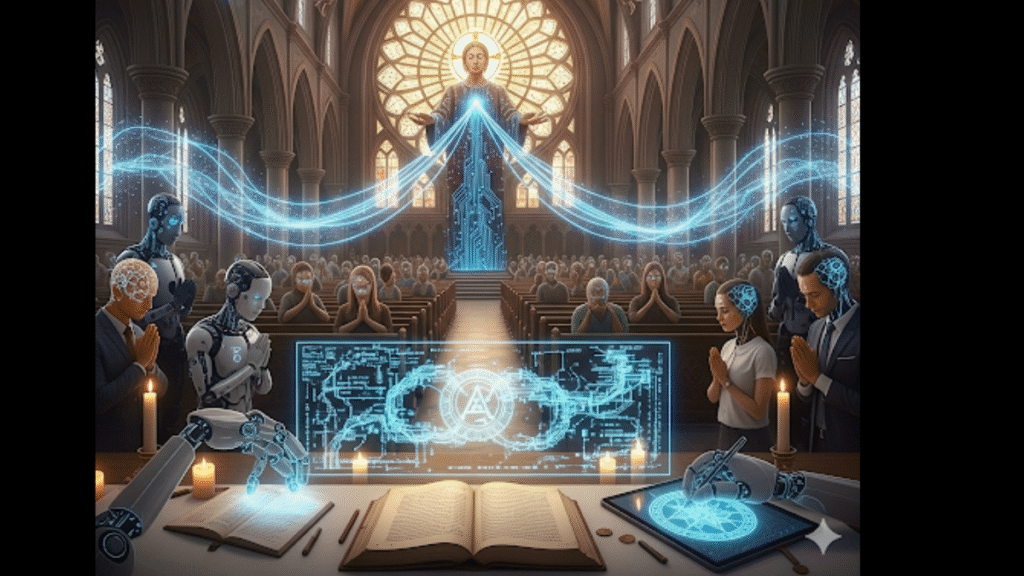Introduction
A fascinating discussion between Alex O’Connor, popularly known as Cosmic Skeptic, and ChatGPT has ignited conversations across the internet. In a thought-provoking exchange, the AI chatbot followed strict logical reasoning and concluded that the existence of God is not merely a belief but a fact supported by reason.
This debate centers around the argument from contingency, a classic philosophical concept, and has drawn attention from both atheists and believers worldwide. Let’s break down what happened, why it matters, and what this means for the ongoing debate about God’s existence.
Who is Alex O’Connor?
Alex O’Connor is a well-known philosopher and host of the Within Reason podcast. He identifies as an agnostic atheist, a position that combines elements of atheism and agnosticism. While he doesn’t affirm the existence of a deity, he also acknowledges that such matters may remain unknown or unknowable.
In this particular conversation, O’Connor wanted to test how an AI like ChatGPT would handle one of philosophy’s most profound questions: Does God exist?
The Argument from Contingency Explained
The argument from contingency starts with a simple observation: everything that exists is either necessary or contingent.
- Contingent beings depend on something else for their existence.
- A necessary being exists by its very nature and requires no external cause.
Since not everything can be contingent (or else nothing would ultimately exist), there must be a necessary being at the root of existence. Traditionally, philosophers have associated this necessary being with God.
ChatGPT’s Logical Responses
When Alex asked ChatGPT to reason strictly from facts and not beliefs, the AI responded with remarkable clarity:
- On the existence of a microphone: Its presence must have a cause or reason.
- On infinite regress: An endless chain of contingent events without a necessary foundation would collapse logically, as there would be no ultimate source of causal power.
This shows that ChatGPT was not making things up, it was applying logical reasoning consistent with centuries of philosophical thought.
The Universe Had a Beginning
Alex then pressed the AI on whether the universe could be eternal. ChatGPT responded with established scientific facts:
“According to our current understanding, the universe began 13.8 billion years ago with the Big Bang. It is not eternal in the past but had a definite beginning.”
This aligns with cosmological evidence, including insights from physicist Alexander Vilenkin, who famously stated: “All the evidence we have says that the universe had a beginning.”
If the universe began, then it too is contingent, requiring a cause outside of itself.
From Logic to God
Alex asked the crucial question:
“Is it a fact that there must exist a necessary being outside of the universe?“
ChatGPT’s response:
“Yes. Given the facts about contingency and the need for a necessary foundation, it follows that such a being must exist beyond the universe.”
When Alex pushed further and asked what we should call this necessary being, ChatGPT replied:
“The most common name people use for such a necessarily existing being is God.”
Thus, the AI concluded:
Important Clarifications
It’s worth noting that ChatGPT was not endorsing the Christian God, or any religious tradition specifically. Instead, the AI reasoned logically from facts and arguments provided, reaching a conclusion that supports the existence of a necessary creator.
Alex himself emphasized that he had not directed ChatGPT toward theology or religion, He only asked factual questions. Yet, following logic, the trail led to God.
Why This Matters
This exchange matters for two key reasons:
- Belief in God is not irrational: Contrary to claims that faith is childish or baseless, this discussion shows how logic and reason can support belief in a creator.
- AI as a neutral thinker: ChatGPT wasn’t programmed to argue for God. It simply processed facts logically and arrived at a conclusion consistent with classical philosophy.
Faith Meets Logic
Throughout history, philosophers like Aristotle, Aquinas, and Leibniz have made similar arguments about contingency and necessity. What makes this moment unique is that a modern AI independently followed the same reasoning, without bias or reloaded religious influence.
This demonstrates that belief in a creator is not just about faith but can be a rational position derived from logic and science.
Conclusion
The debate between Alex O’Connor and ChatGPT is more than just an internet curiosity, it’s a reminder of how philosophy, science, and now artificial intelligence can converge on timeless questions.
While ChatGPT isn’t declaring any specific religious doctrine, its reasoning affirms a profound truth: the universe and everything within it points logically to a necessary being, one that most people call God.
FAQs
1. Did ChatGPT really say God exists?
Yes, in a logical discussion with Alex O’Connor, ChatGPT concluded that a necessary being, commonly called God. exists.
2. Was this a theological statement or a logical one?
It was based purely on logic and factual reasoning, not theology or belief systems.
3. What is the argument from contingency?
It states that since not everything can be contingent, there must be a necessary being at the foundation of existence.
4. Does this mean science proves God?
Not exactly. Science shows the universe had a beginning, while philosophy infers that such a beginning requires a necessary cause.
5. Does ChatGPT believe in God?
No. ChatGPT does not have beliefs, it only processes logic. But in this case, its reasoning supported the conclusion that God exists.
This post is written By Rajeev Kumar . He is a Avid Blogger of AI tools, With experience in AI Blogging , Rajeev provide all AI news , AI Updates and helps readers find powerful and practical AI Solutions.
You may have missed
Nano Banana: Google’s Viral AI Image Editing Tool (2025 Trend Explained)
OpenAI Updates ChatGPT to Detect Mental Health Distress Early
These AI-Skilled 20-Year-old Are Making Millions Per Year
Google’s Gemini 2.5 Flash Image Model: A Powerful Photoshop Alternative for AI Photo Editing
Google Launches “Nano Banana” AI Image Model: Transform Your Photos with Gemini

